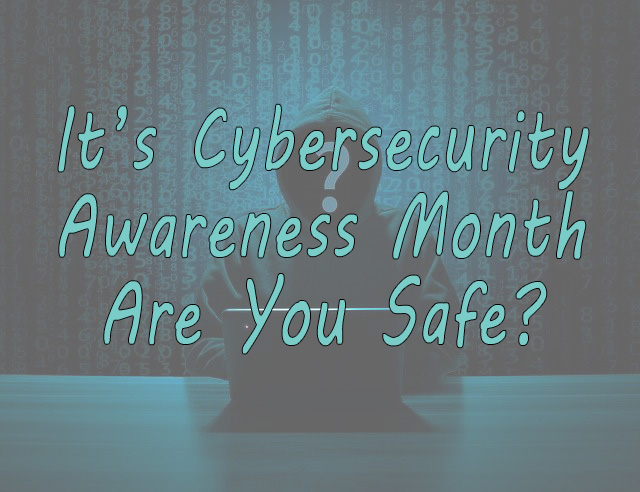Cybersecurity is about more than just network security. A cyber criminal can get into any business if they try hard enough. Perhaps that’s why we now have a cybersecurity awareness month every October. The problem only gets bigger and harder to control as more of our lives and business move online. So, just how cyber-aware are you? How protected is your business? We have a few questions for you to test out your knowledge.
True or False
- All passwords should contain a capital, lower case letter, symbol and number.
- If you receive an email that indicated you have been infected with ransomware, you should immediately forward the email to your supervisor or IT department.
- You’re buying something on a website for personal use on the company computer or network, no big deal, you’re paying for it on your own credit card.
- I should always follow prompts for updating to a current software version no matter how I receive them.
- My computer can’t share a virus even if I clicked on it unless I share it somehow.
The Answers
We hope you put some thought into these answers and that learning the correct actions in the above scenarios increase your cybersecurity awareness. Here are the answers. Sorry if you feel tricked as some have some truth mixed in.
- Yes and no. First, we suggest thinking of a password as a passphrase. That’s because the longer a password, the more difficult it is to hack. Meaning a password that looks like this Ih8M0nday! Isn’t as complex as iH8mondaybutLoveDogsmore.
- The first thing you should do is unplug your computer from the network and turn off your Wi-Fi. Then call your IT support person or managed services provider. Depending on your company’s protocol, you should likely also notify your supervisor as to why you’re offline.
- Although every business has its own rules, if you’re on a website and make a purchase and that website has been hacked (and no you won’t necessarily be able to tell) and doesn’t have an SSL certificate, you’re putting your entire network in jeopardy. Shop at home on your own computer or use your phone on the mobile carrier’s data. If you’re purchasing something for your business, make sure the site begins with HTTPS.
- This one is almost always false. The exception is when your company IT Policies mandate accepting all updates presented to you. In most cases, you should hear from your managed services provider or IT person that an update is coming or that your computer needs to be restarted for the latest update to take effected. Don’t fall for phishing emails or pop-ups.
- This one is generally false. If you recognize that an email or attachment is a danger and don’t even open the email, you are likely safe. However, as hackers get more sophisticated that may change.
How Toucan Technology Group Can Help Your Business
We help businesses with their network security. That includes setting up secure networks, installing software to help prevent cyber-attacks, establishing network protocols for your company and backing up all company data. If this quiz helped you realize that your business needs us, call us for a no obligation consultation at (317) 376-4874. Let us help you get a passing grade next year during cybersecurity awareness month!

